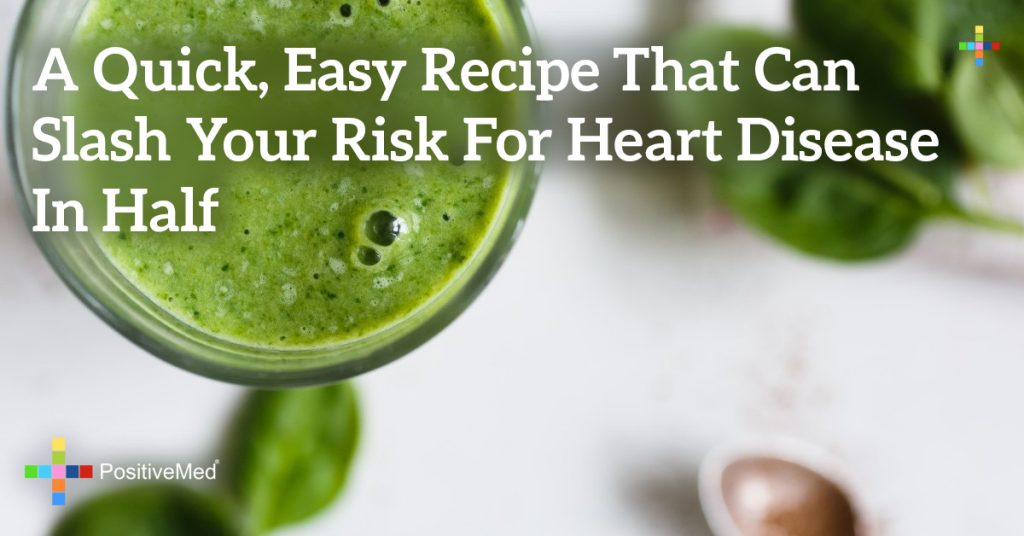
A Quick, Easy Recipe That Can Slash Your Risk for Heart Disease in Half
Heart disease claims more lives than all varieties of cancer combined. In fact, it’s the #1 cause of death in the entirety of America. There are many specific forms of heart disease, but clogged arteries are one condition that often spawns more conditions. Empower yourself by taking simple steps to greatly reduce your risk.

Atherosclerosis is the medical term for clogged arteries. This cardiovascular disease progresses slowly over many years, becoming more dangerous in old age. Plaque made out of fat and waste substances gradually builds up on the walls of blood vessels. When enough plaque has accumulated, proper blood flow can be compromised. Having atherosclerosis can easily lead to more severe heart conditions, including peripheral vascular disease, heart attack, and stroke. Clogged arteries cause around 26,000 deaths per year in the U.S., yet this condition is easily preventable through healthy lifestyle measures.
One of the most important factors in preventing clogged arteries and other heart problems is eating a healthy diet. Surprisingly, limiting your fat intake may not be the best way to keep your heart healthy. Rather, evidence suggests that increasing your intake of vegetables is the way to go. Several studies support this theory, including a long-term study of over 100,000 people, conducted by Harvard University. Researchers found that people who ate at least eight servings of vegetables daily were about one-third less likely to contract a heart disease than those who only ate 1.5 servings daily. Another study, examining data from 1,300 senior citizens, found that those who ate at least one cup of vegetables per day were 60% less likely to get heart disease. Eating vegetables is crucial to your health, especially as you get older.
RELATED ARTICLE: 10 Foods to Help Prevent Clogged Arteries
The eight servings mentioned earlier may sound like a lot to you, but it’s surprisingly easy to achieve, as one serving of vegetables is just half a cup (or one cup for leafy vegetables). However, if you find it difficult to get enough vegetables with your meals, an easy way to do so is through a supplemental smoothie. Try this recipe:
Ingredients:
1/2 cup broccoli florets, separated
1/2 cup raw fresh spinach leaves
1/2 cup tomato slices or cherry tomatoes
1/4 cup chopped celery
1 grated carrot
1-2 cups green tea, chilled
Directions:
1. Blend all ingredients, except for the green tea, in a blender until the mixture has a smooth consistency.
2. Add the green tea, and blend for a few more seconds.
3. Enjoy! This smoothie has less than 150 calories and provides 4 servings of vegetables.
Tip: If you don’t like the taste of vegetable-only smoothies, try replacing the green tea with fruit juice and adding a banana.
Improving your intake of fresh, raw vegetables will go a long way toward greatly reducing your risk of atherosclerosis and other heart conditions.
Other dietary changes you can make include:
- Limit your intake of unhealthy fats, and replace them with healthy fats. Healthy fat sources include olive oil, fish, avocados, nuts, and seeds.
- Limit your intake of red meat, dairy, and junk food, as these are high in saturated and trans fats.
- Limit your sodium intake. Hidden sources of large amounts of salt include cured meats, cold cuts, pizza, poultry, soup, and sandwiches.
- Reduce your intake of added sugars, often found in beverages, baked goods, desserts, breakfast cereal, and granola bars.
- Eat as much whole grain as possible. This doesn’t mean eat extra, but rather to replace your non-whole grain carbohydrates with whole grain ones.
More lifestyle changes that prevent heart disease include:
- Exercise regularly. This could be as simple as taking a brisk 15-minute walk daily.
- Get as much sleep as you need every night. Lack of sleep increases your risk for heart disease.
- Don’t use tobacco, and avoid second-hand smoke exposure.





